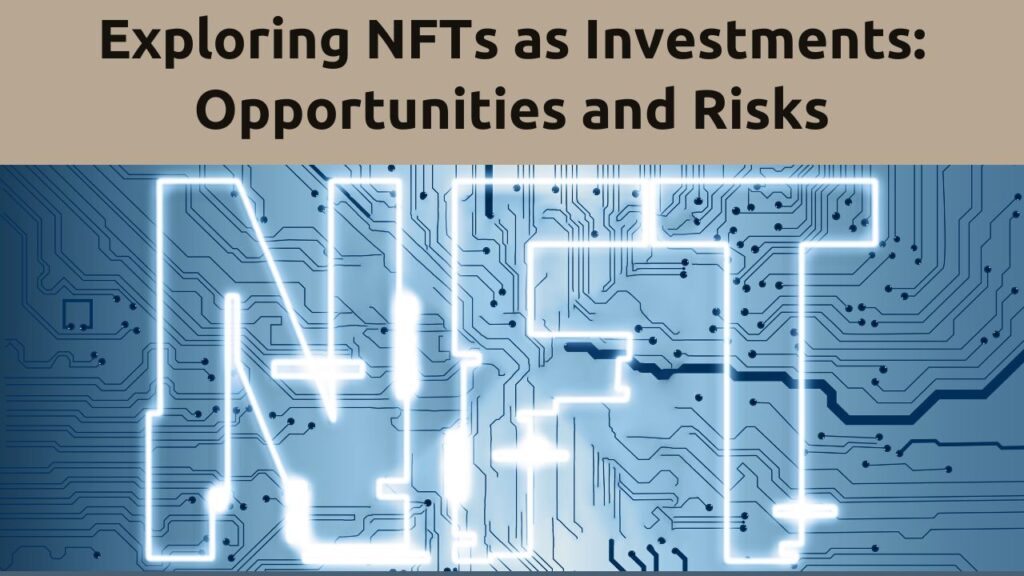In recent years, the digital landscape has witnessed the rise of Non-Fungible Tokens (NFTs) as a novel form of investment. NFTs represent unique digital assets stored on blockchain technology, making them verifiably scarce and indivisible. While NFTs have garnered significant attention and value, investors must navigate a landscape rife with opportunities and risks. This article explores the potential of NFTs as investments, delving into their opportunities, risks, and frequently asked questions.
Opportunities
1. Diversification
NFTs offer investors a unique opportunity to diversify their portfolios beyond traditional asset classes such as stocks and bonds. They provide exposure to digital art, collectables, virtual real estate, and more, expanding the investment landscape.
2. Potential for High Returns
The market for NFTs has seen exponential growth, with some digital artworks fetching millions of dollars. Early adopters have reaped substantial returns on their investments, showcasing the potential for lucrative gains.
3. Ownership and Authenticity
NFTs utilize blockchain technology to provide immutable ownership records, ensuring authenticity and provenance. This feature appeals to collectors and investors seeking assurance of the asset’s uniqueness and scarcity.
4. Accessibility
NFTs have democratized investment opportunities, allowing anyone with an internet connection to participate in the digital economy. This accessibility fosters a diverse and inclusive investor community.
5. Cultural Impact
NFTs have the potential to revolutionize how creators monetize their work, empowering artists, musicians, and other content creators to reach a global audience and capture value directly from their creations.
Risks
1. Market Volatility
The NFT market is highly volatile, with prices subject to rapid fluctuations based on speculation and market sentiment. Investors must be prepared for significant price swings and the possibility of substantial losses.
2. Lack of Regulation
Unlike traditional financial markets, the NFT space operates with limited regulation, exposing investors to potential fraud, scams, and market manipulation. Due diligence is essential to mitigate these risks.
3. Technological Risks
NFTs rely on blockchain technology, which is susceptible to technical issues such as network congestion, hacking, and smart contract vulnerabilities. Investors should be aware of these risks and take appropriate precautions.
4. Illiquidity
NFTs can be illiquid assets, meaning they may be difficult to buy or sell quickly without affecting the market price. Investors should consider their liquidity needs and the potential challenges of exiting their positions.
5. Bubble Concerns
Some analysts warn of a potential NFT bubble, fueled by speculative fervor and exuberant valuations. Investors should exercise caution and avoid FOMO (Fear of Missing Out) when evaluating NFT investments.
Conclusion
Non-fungible tokens (NFTs) represent a burgeoning asset class with both opportunities and risks for investors. While NFTs offer diversification, high return potential, and verifiable ownership, they also carry risks such as market volatility, lack of regulation, and technological vulnerabilities. As with any investment, thorough research, risk management, and a long-term perspective are essential for navigating the NFT landscape responsibly.
FAQs
Are NFTs only limited to digital art?
While digital art is a prominent use case for NFTs, they can represent a wide range of assets, including collectables, virtual real estate, music, videos, and more.
How do I know if an NFT is authentic?
NFTs utilize blockchain technology to provide immutable ownership records, ensuring authenticity and provenance. Verify the NFT’s ownership history and authenticity on the corresponding blockchain network.
Can I sell my NFT whenever I want?
The liquidity of NFTs varies depending on factors such as demand, market conditions, and the specific asset. Some NFTs may be readily tradable, while others could be illiquid and challenging to sell quickly.
Are there any taxes associated with buying or selling NFTs?
Tax regulations regarding NFTs vary by jurisdiction and can be complex. Consult with a tax professional to understand your tax obligations related to buying, selling, and holding NFTs.
How can I protect my NFT investments from cyber threats?
To mitigate technological risks, practice good cybersecurity hygiene, use reputable platforms and wallets, employ multi-factor authentication, and stay informed about emerging threats and best practices in the NFT space.







